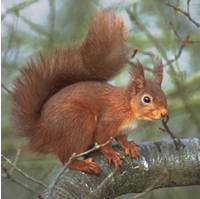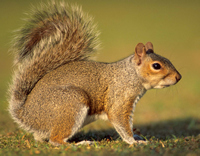Operation Squirrel
Background
 Red Squirrel |
In 2002 a partnership of organisations and individuals on the Isle of Wight
had to put into practice an emergency plan to protect red squirrels. In
July 2001 a female grey squirrel was found dead on the road near Afton,
Freshwater. Three fresh sightings in woods at the western end of the Island
in 2002 sparked fears that grey squirrels might have been breeding successfully.
The grey squirrels will out-compete the reds for food and shelter and are
carriers of the deadly parapox virus which could wipe out the Island’s
population of red squirrels. The Isle of Wight is the last stronghold in
the south of England for our declining native red squirrel and a constant
vigil is kept to prevent them being wiped out by grey squirrels from the
mainland.
The only way to protect the vulnerable red squirrels is to prevent grey
squirrels gaining a toehold on the Island. A team of local and national
experts swung into action to trap and humanely kill any grey squirrels.
The Isle of Wight Council, Wight Squirrel Project, Wight Wildlife, English
Nature, the Forestry Commission and Forest Enterprise joined forces to tackle
the problem.
Landowners gave their consent for trained forestry rangers to lay cage traps
in their woodlands. The traps were checked several times a day. The traps
are designed and set so that they are unlikely to catch Red Squirrels; if
any became accidentally captured they were released quickly, as every trap
is inspected several times daily. Special hair tubes were laid in woodlands
to capture small samples of squirrel hair, and establish how far the grey
squirrels had spread.
The Isle of Wight Council Ecology Officer Colin Pope said: “We asked
members of the public to report possible sightings to help us act quickly.
Grey squirrels have grey rather than reddish-brown fur, no ear tufts, and
are bigger than red squirrels. They are quite bold and will run along the
ground. Anyone who spots a grey squirrel today should contact me at the
Isle of Wight Council straight away with the details.”
Results of Operation Squirrel
The operation was a success, and no further evidence of grey squirrels was found. No grey squirrels were trapped and no grey hairs were found. Reports of grey squirrels were received but none was ever verified, although each was investigated. This result means meaning that there is unlikely to be an established population of greys on the Island, although a few individuals might somehow be living wild.The operation also put to the test the emergency response plan which had
been devised for some years, and all the partners benefited from learning
how best to respond should there ever be a similar emergency. Thorough the
publicity created by the operation, landowners and other local people certainly
became more aware of the importance of keeping the Isle of Wight a 'red
only' area. The Council and the Wight Squirrel Project had many more people
reporting 'grey' squirrels.
Despite this, those involved with squirrel conservation are not complacent.
The potential for an accidental or deliberate introduction of grey squirrels
to the Isle of Wight is just as real and just as serious as it was before
Operation Squirrel. The watch for grey squirrels continues, and if the emergency
plan is required, the partners are ready to implement it again.
 |
| Grey Squirrel |
Contacts
To report grey squirrel sightings or to find out more information about squirrels on the Isle of Wight:
Contact the Countryside Section
- tel: 01983 823891
- email: [email protected]





